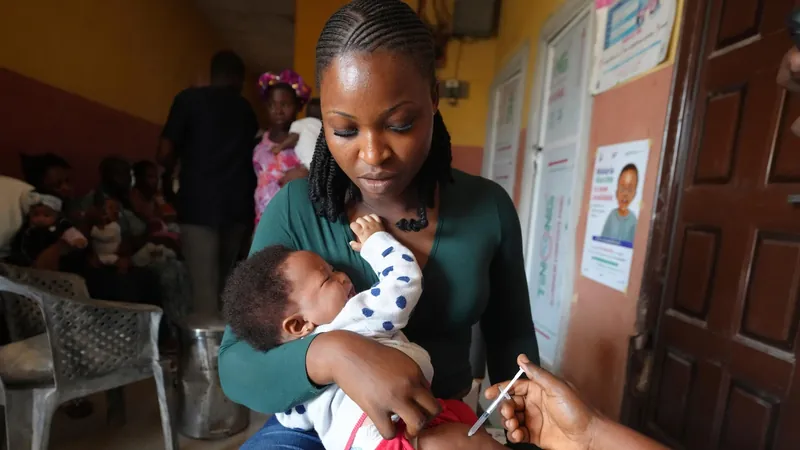
Nigeria Takes a Bold Step in the Fight Against Malaria by Vaccinating Young Children
2024-12-12
Author: Rajesh
Nigeria Takes a Bold Step in the Fight Against Malaria by Vaccinating Young Children
BAYELSA, Nigeria – Ominike Marvis can hardly remember a time when her 6-year-old son wasn't battling malaria. Frustrated and fatigued by the relentless impact of this deadly disease, Marvis welcomed the Nigerian government's decision to offer a malaria vaccine, eager to safeguard her youngest child.
Last week, the vaccination campaign was launched in Bayelsa State, one of the most severely impacted regions in Nigeria. Marvis took her 6-month-old baby to a local health center to receive his first dose of the newly deployed malaria vaccine. “At least I know he’s safe from it now,” the 31-year-old mother sighed with relief after the shot.
Malaria continues to pose a significant threat in Africa, which accounts for around 93% of malaria cases globally. Nigeria, as the continent's most populous country, bears the largest burden, representing a staggering 25% of all malaria cases.
According to a sobering World Health Organization (WHO) report published earlier this week, there were approximately 263 million cases of malaria worldwide in 2022, resulting in about 597,000 deaths, primarily among children under the age of 5. These figures reflect an increase of 11 million cases compared to the previous year, underscoring the urgent need for effective interventions.
WHO Director-General Tedros Adhanom Ghebreyesus emphasized that “no one should die of malaria,” highlighting the disproportionate impact the disease has on vulnerable populations in Africa, particularly young children and pregnant women. He called for increased support for malaria control measures across the continent.
In response to this urgent crisis, 17 African nations are now administering malaria vaccines to young children, with Nigeria beginning its campaign using a vaccine developed by Oxford University. Preliminary research indicates that this vaccine boasts over 75% effectiveness in preventing severe disease and death during its first year, with continued protection following a booster shot.
Muhammad Ali Pate, Nigeria’s health minister, hailed the vaccination effort as a "monumental step" toward eradicating malaria from the country. However, tackling the disease extends beyond vaccination; experts stress the importance of additional preventive measures such as insecticide-treated bed nets and widespread spraying.
Nigeria's considerable malaria burden stems from a population exceeding 210 million people, compounded by environmental factors and systemic issues like poor sanitation and limited access to treated bed nets. The WHO report also warns that fragile health systems, weak surveillance, and emerging drug and insecticide resistance further complicate efforts to combat malaria.
Amidst these challenges, there is also light at the end of the tunnel: the report notes a 16% reduction in malaria deaths across the African region since 2015. Remarkably, out of the 83 countries where malaria is still prevalent, 25 of them report fewer than 10 cases annually.
In Bayelsa State, rich in oil yet facing poverty, malaria is so endemic that families in riverside communities often describe living in its shadow. “Here, malaria is something we are used to,” reflected Claris Okah, a community health worker dedicated to educating families about the new vaccine and preventative measures.
Despite initial hesitancy among parents about the vaccine, Okah remains optimistic: “The vaccine is a good thing.” With education and vaccination efforts underway, there is hope that Nigeria can turn the tide against this age-old adversary and protect its youngest citizens from the grips of malaria.
*Stay tuned for more updates on Nigeria's battle against malaria and the impact of vaccination strategies in the region.*





 Brasil (PT)
Brasil (PT)
 Canada (EN)
Canada (EN)
 Chile (ES)
Chile (ES)
 España (ES)
España (ES)
 France (FR)
France (FR)
 Hong Kong (EN)
Hong Kong (EN)
 Italia (IT)
Italia (IT)
 日本 (JA)
日本 (JA)
 Magyarország (HU)
Magyarország (HU)
 Norge (NO)
Norge (NO)
 Polska (PL)
Polska (PL)
 Schweiz (DE)
Schweiz (DE)
 Singapore (EN)
Singapore (EN)
 Sverige (SV)
Sverige (SV)
 Suomi (FI)
Suomi (FI)
 Türkiye (TR)
Türkiye (TR)